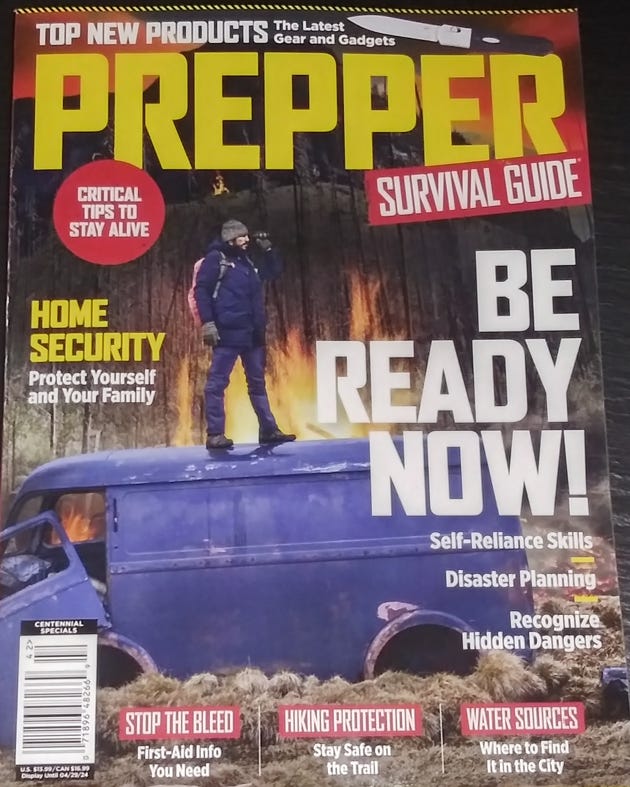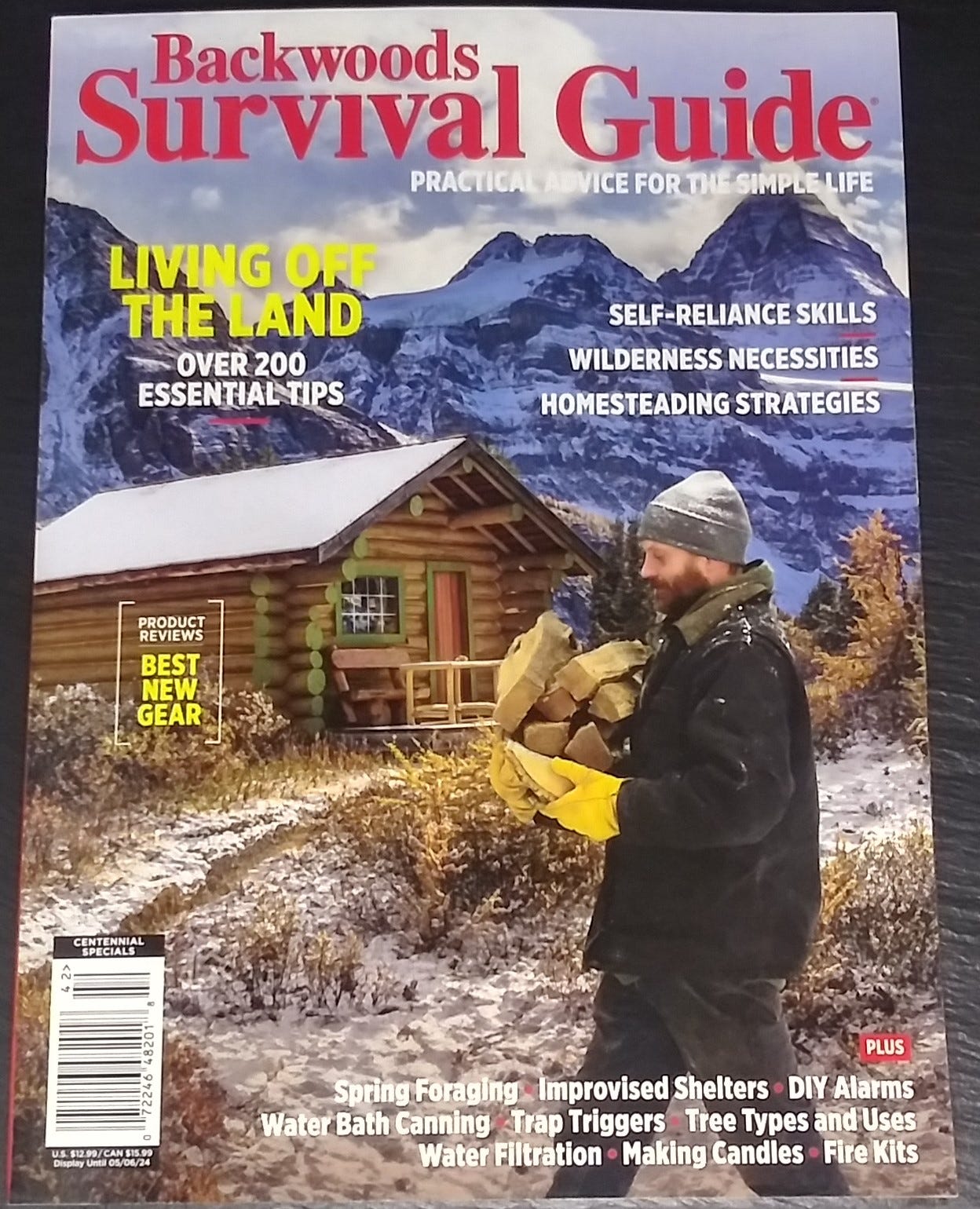Hey everyone, thanks for checking out the newsletter this week. For the last few days, I’ve been working on my presentation for the Wisconsin Emergency Management annual conference. I’ll be speaking there on Thursday. This is a very different sort of class for me, and I’ll admit I’m sweating it a little bit.
To date, my presentations and classes have centered on educating people on how to be better prepared. With this one, I’m speaking to a room filled with state, county, and local emergency managers, people who theoretically know all that stuff. The objective is to show them various ways that they can help the people in their communities become more self-reliant, and explain why that’s important. Along the way, hopefully I can dispel some biases they might have regarding the disaster readiness community. To that end, here’s a snippet from the presentation.
Honestly, I dislike the terms prepper and survivalist. Neither of them, by commonly accepted definitions, fully applies to what I’m trying to teach and encourage. Speaking in general terms, a prepper is someone who focuses on stockpiling food, water, and supplies in the event of some sort of crisis. A survivalist, in turn, is often seen as someone who concentrates on wilderness survival skills. There is sometimes an element of, let’s call it tactical ability, in the works there as well.
I want people to stock up on necessities, absolutely. But I also want them to learn and hone skills like first aid, communication, storm spotting, wild edibles identification, scratch cooking, budgeting, and self-defense. I want them to be able to feed their family during a trying time. I also want them to be able to build a fire, find their way from Point A to Point B with a map and compass, grow a garden, preserve the harvest, hunt and trap food, filter and purify water.
Perhaps most important of all, I want them to be able to use their head for more than just a hat rack. I suppose the best term might be self-reliant, though even that doesn't sound quite right. The point here is that while I may use the terms prepper and survivalist, that's primarily because I've not come across a better term to use.
We’ll see how it goes.
* * *
Prepper Tip -- It won’t be long before we’ll be spending a lot more time outdoors, working in the garden or hiking trails, and battling mosquitoes. Where I live, these buggers come large enough to qualify as small engine aircraft. More than once, we’ve been driven completely off a trail and back to the car due to swarms of the bloodsuckers.
Bug repellent is great, but consider adding a mosquito head net to your arsenal. Not only will it keep the bugs off your face, it’ll do it without having to smear gunk near your eyes or mouth. Combine the net with a brimmed hat so the net doesn’t rest right on your skin, lest the bugs bit through it and into you. Most of these nets come equipped with a drawstring and toggle so you can snug it up at your neckline.
For those who demand multiple uses of out of every piece of gear, you could use the net as a prefilter when treating water in the field, should that be necessary.
* * *
Here’s an article I did for American Survival Guide a couple of years ago, long before they changed their name to American Outdoor Guide. It’s about putting together a small tool kit for your EDC pack.
* * *
I’ve mentioned this before, but thought it might be time for a reminder. While I’m all for amassing a survival library at home, I feel it is even more important to actually read the books, magazines, printed out blog posts, and other information you collect. That knowledge isn’t going to seep into your brain through osmosis.
As I’ve written in so many Letters from the Editor in my magazines, we authors and instructors have the easy job with providing the information. It’s up to the readers to put it to actual use.
* * *
My friend Fred Liken recently did an interesting video on what he calls Homemade MREs. I know some might quibble with that label, but the idea is simply to share ideas on food items that would work well in a bug out bag or similar setup.
* * *
I recently agreed to lead a couple of classes at the upcoming Wisconsin Prepper Expo. The schedule hasn’t been published yet, but I’ll be discussing financial preparedness as well as prepping with children. I’ll be there Saturday and Sunday that weekend. More details when I have them.
* * *
We did another night hike over the weekend, so I wasn’t able to grab any photos from it. Instead, here’s a photo from a hike we did a couple of years ago at a park on the shore of Lake Michigan. I’m really hoping we can find time to get back there again this year.
Survival Tip – Afraid of the Dark?
We live in a world where light is pretty much always at our fingertips. No matter how late at night it might be, flip a switch and it’s like the middle of the day. But what if that switch didn’t work? What if the lights went out and it was going to be awhile before they came back on again?
My wife and I go walking every day, typically in the morning. But once the weather warms up a bit more, we’ll shift and do at least some of those walks at night. It’s typically quiet and peaceful. Things look a lot different at night, too. There’s a perspective you get that’s unique and you’ll find yourself noticing things that you didn’t before.
The same thing applies to just your own backyard. Spend time sitting out there well after dark, leave the yard lights off, and just hang out for a while. See how many critters you can identify. We live on the edge of a smallish town and we have everything from rabbits and squirrels to fox and mink visiting us.
Turning indoors, how well can you navigate your house in the dark? I don’t mean just shuffling your way to the bathroom in the middle of the night. Can you get from one end of your house to the other without turning on any lights?
To be clear, I’m not suggesting that you should be able to operate in total darkness like some sort of B-movie ninja. However, many of us have an inherent fear of the dark and it pays to do what you can to get over it. The more comfortable you are in a lights out environment, the better off you’ll be if you’re suddenly tossed into that situation.
Prepper Survival Guide and Backwoods Survival Guide
For those new to my little corner of the Internet, I am the Editor in Chief for both Prepper Survival Guide and Backwoods Survival Guide magazines. Here are the covers for the current issues that are available in stores right now.
You can find them just about anywhere magazines are sold, including:
Walmart
Sam's Club
Costco
Publix
Walgreens
Rite Aid
CVS
Tractor Supply
Fleet Farm
Barnes & Noble
Subscriptions to both titles are available here.
Questions, Comments, Complaints, Concerns?
I am always just an email away - jim@survivalweekly.com.




Pvs14 would make a great investment